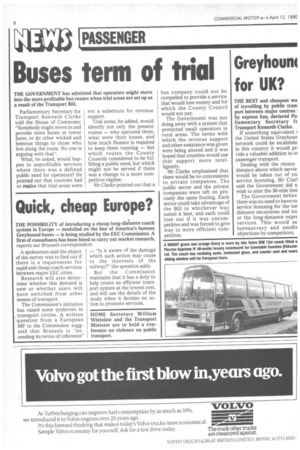Buses term of trial
Page 10

If you've noticed an error in this article please click here to report it so we can fix it.
THE GOVERNMENT has admitted that operators might move into the more profitable bus routes when trial areas are set up as a result of the Transport Bill.
Parliamentary Secretary for Transport Kenneth Clarke told the House of Commons: "Somebody might move in and provide more buses or lower fares, or do other wicked and heinous things to those who live along the route. No one is arguing with that".
What, he asked, would happen to unprofitable services where there was a defined public need for operators? He pointed out that counties had to realise that trial areas were not a substitute for revenue support.
Trial areas, he added, would identify not only the present routes — who operated them, what were their losses, and how much finance is required to keep them running — but which routes the County Councils considered to be fulfilling a public need, but which might not be served if there was a change to a more competitive regime.
Mr Clarke pointed out that a bus company could not be compelled to provide a service that would lose money and for which the County Council would not pay.
The Government was not doing away with a system that protected small operators in rural areas. The terms with which the revenue support and other assistance was given were being altered and it was hoped that counties would use that support more intelligently.
Mr Clarke emphasised that there would be no concessions to private companies. The public sector and the private companies were left on precisely the same footing. Each sector could take advantage of the Bill in whichever way suited it best, and each could lose out if it was uncompetitive and was forced to give way to more efficient competition.
















































































